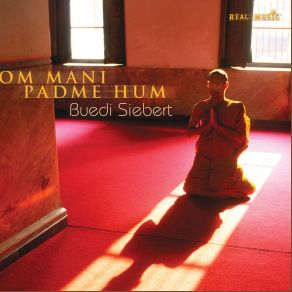Om Mani Padme Hum
Download links and information about Om Mani Padme Hum by Büdi Siebert / Budi Siebert. This album was released in 2004 and it belongs to New Age, Rock, Alternative genres. It contains 12 tracks with total duration of 58:50 minutes.

|
|
|---|---|
| Artist: | Büdi Siebert / Budi Siebert |
| Release date: | 2004 |
| Genre: | New Age, Rock, Alternative |
| Tracks: | 12 |
| Duration: | 58:50 |
| Buy it NOW at: | |
| Buy on iTunes $9.99 | |
| Buy on Amazon $8.99 | |
Tracks
[Edit]| No. | Title | Length |
|---|---|---|
| 1. | Om Mani Padme Hum (short Version) | 4:47 |
| 2. | Om Mani Peme Hung Hrih | 4:54 |
| 3. | Lotus Call Part 1 (Vajra Guru Mantra) | 7:30 |
| 4. | The Lotus In the Mountains | 6:11 |
| 5. | The Lotus People | 7:48 |
| 6. | Free Spirit | 4:41 |
| 7. | Wind from the Temple | 1:21 |
| 8. | Lotus Call Part 2 | 4:05 |
| 9. | To All Living Beings | 1:22 |
| 10. | Om Mani Padme Hum (long Version) | 9:22 |
| 11. | Om Mani Peme Hung Hrih (mantra Version) | 4:57 |
| 12. | Breeze from Lotus Mountain | 1:52 |
Details
[Edit]Real Music has always centered its wide array of new age releases on elements of the spiritual realm, and has recently embarked on a compilation series of "comfort music." On this recording, named for an easy-to-recite Buddhist chant that is the essence of the Buddha's heart, Buedi Siebert takes this path of peace to a specific place, as easy to visualize as a clear-air gust of wind high on a mountain in Tibet. Westerners seeking some basic knowledge of Buddhist philosophy will enjoy the simple but informative liner notes that explain the source of this soothing, ambient music that incorporates Siebert's lush, dreamy guitar lines and his mastery of numerous indigenous flutes with the soaring vocals of Dorothea Ferber and other chants done by male voices. The short version of the title track opens the disc by creating an inviting and soul-lifting Asian atmosphere that is easy to hum along with. Some of the tunes just float sweetly along while others, like "The Lotus People," feature more jangly, percussive beats. On that particular tune, the mantra is reprised with a mix of voice and flute. Siebert lends an even truer air of authenticity with "Lotus Call, Pt. 2," which features authentic chanting Buddhist monks. At the very minimum, the listener will be transported into a very relaxing place. Hopefully, the complexities of the music beneath the basic "Om" will inspire deeper meditation and possibly study into the philosophy that inspired it.